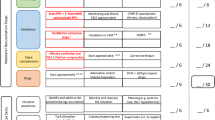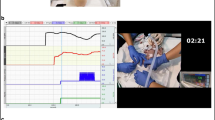Abstract
Objective
To determine if e-learning interventions are efficient to review Neonatal Resuscitation Program (NRP) and to prevent performance deterioration in neonatal resuscitation of already-certified healthcare professionals.
Study design
In this scoping review, we searched for manuscripts published until June 2020 in five databases. We included all studies on e-learning use for NRP review in already-certified healthcare providers.
Results
Among 593 abstracts retrieved, 38 full-text articles were assessed for eligibility. Five studies were included. Four studies evaluated the effectiveness of e-learning interventions immediately or months after their completion by providers. These interventions did not consistently enhance their NRP knowledge and their performance. One study showed that a growth mindset can influence positively neonatal resuscitation performance after an e-learning simulation.
Conclusion
There is not enough evidence to conclude that e-learning interventions can prevent neonatal resuscitation knowledge and performance decay in already-certified providers. More research is needed on the use of e-learning simulation-based scenarios to improve NRP retention.
This is a preview of subscription content, access via your institution
Access options
Subscribe to this journal
Receive 12 print issues and online access
$259.00 per year
only $21.58 per issue
Buy this article
- Purchase on SpringerLink
- Instant access to the full article PDF.
USD 39.95
Prices may be subject to local taxes which are calculated during checkout

Similar content being viewed by others
Data availability
The details of the research strategy are available in the Appendix.
References
Niermeyer J. From the Neonatal Resuscitation Program to Helping Babies Breathe: global impact of educational programs in neonatal resuscitation. Semin Fetal Neonatal Med. 2015;20:300–208. https://doi.org/10.1016/j.siny.2015.06.005
Trevisanuto D, Ferrarese P, Cavicchioli P, Fasson A, Zanardo V, Zacchello F. Knowledge gained by pediatric residents after neonatal resuscitation program courses. Paediatr Anaesth. 2005;15:944–7. https://doi.org/10.1111/j.1460-9592.2005.01589.x
Patel J, Posencheg M, Ades A. Proficiency and retention of neonatal resuscitation skills by pediatric residents. Pediatrics. 2012;130:515–21. https://doi.org/10.1542/peds.2012-0149
Aziz K, Lee CHC, Escobedo MB, Hoover AV, Kamath-Rayne BD, Kapadia VS, et al. Part 5: Neonatal Resuscitation 2020 American Heart Association Guidelines for cardiopulmonary resuscitation and emergency cardiovascular care. Pediatrics. 2021;147(Suppl 1):e2020038505E. https://doi.org/10.1542/peds.2020-038505E
Choules AP. The use of elearning in medical education: a review of the current situation. Postgrad Med J. 2007;83:212–6. https://doi.org/10.1136/pgmj.2006.054189
Bryan VC. The power, peril, and promise of information technology to community education. In: Bryan VC, Wang VCX, editors. Technology use and research applications for community education and professional development. Hershey, PA: IGI Global; 2013. p. 1–23.
Fontaine G, Cossette S, Maheu-Cadotte MA, Mailhot T, Deschênes MF, Mathieu-Dupuis G. et al. Efficacy of adaptive e-learning for health professionals and students: a systematic review and meta-analysis. BMJ Open. 2019;9:e025252. https://doi.org/10.1136/bmjopen-2018-025252
Bolan NE, Newman SD, Nemeth LS. Technology-based newborn health learning initiatives for facility-based nurses and midwives in low- and middle-income countries: a scoping review. Int J Childbirth. 2018;8:252–68. https://doi.org/10.1891/2156-5287.8.4.252
Jukkala AM, Henly SJ. Provider readiness for neonatal resuscitation in rural hospitals. J Obstet Gynecol Neonatal Nurs. 2009;38:443–52. https://doi.org/10.1111/j.1552-6909.2009.01037.x
Bender J, Kennally K, Shields R, Overly F. Does simulation booster impact retention of resuscitation procedural skills and teamwork? J Perinatol. 2014;34:664–8. https://doi.org/10.1038/jp.2014.72
Tricco AC, Lillie E, Zarin W, O'Brien KK, Colquhoun H, Levac D. et al. PRISMA Extension for Scoping Reviews (PRISMA-ScR): checklist and explanation. Ann Intern Med. 2018;169:467–73. https://doi.org/10.7326/M18-0850
Aromataris E, Munn Z, editors. Joanna Briggs Institute Reviewer’s Manual. 2017. https://reviewersmanual.joannabriggs.org/
Moher D, Liberati A, Tetzlaff J, Altman DG, PRISMA Group. Preferred reporting items for systematic reviews and meta-analyses: the PRISMA statement. PLoS Med. 2009;6:e1000097. https://doi.org/10.1371/journal.pmed.1000097
Curran VR, Aziz K, O’Young S, Bessell C. Evaluation of the effect of a computerized training simulator (ANAKIN) on the retention of neonatal resuscitation skills. Teach Learn Med. 2004;16:157–64. https://doi.org/10.1207/s15328015tlm1602_7
Cutumisu M, Brown M, Fray C, Schmölzer GM. Growth mindset moderates the effect of the neonatal resuscitation program on performance in a computer-based game training simulation. Front Pediatr. 2018;6:195. https://doi.org/10.3389/fped.2018.00195
Hawkes CP, Walsh BH, Ryan CA, Dempsey EM. Smartphone technology enhances newborn intubation knowledge and performance amongst paediatric trainees. Resuscitation. 2013;84:223–6. https://doi.org/10.1016/j.resuscitation.2012.06.025
Kaczorowski J, Levitt C, Hammond M, Outerbridge E, Grad R, Rothman A. et al. Retention of neonatal resuscitation skills and knowledge: a randomized controlled trial. Fam Med. 1998;30:705–11.
Stephenson E, Salih Z, Cullen DL. Advanced practice nursing simulation for neonatal skill competency: a pilot study for successful continuing education. J Contin Educ Nurs. 2015;46:322–5. https://doi.org/10.3928/00220124-20150619-04
Binkhorst M, Coopmans M, Draaisma J, Bot P, Hogeveen M. Retention of knowledge and skills in pediatric basic life support amongst pediatricians. Eur J Pediatr. 2018;177:1089–99. https://doi.org/10.1007/s00431-018-3161-7
Sullivan A, Elshenawy S, Ades A, Sawyer T. Acquiring and maintaining technical skills using simulation: initial, maintenance, booster, and refresher training. Cureus. 2019;11:e5729. https://doi.org/10.7759/cureus.5729
Niles D, Sutton RM, Donoghue A, Kalsi MS, Roberts K, Boyle L. et al. “Rolling Refreshers”: a novel approach to maintain CPR psychomotor skill competence. Resuscitation. 2009;80:909–12. https://doi.org/10.1016/j.resuscitation.2009.04.021
Nishisaki A, Donoghue AJ, Colborn S, Watson C, Meyer A, Brown CA,III. et al. Effect of just-in-time simulation training on tracheal intubation procedure safety in the pediatric intensive care unit. Anesthesiology. 2010;113:214–23. https://doi.org/10.1097/ALN.0b013e3181e19bf2
Acknowledgements
We wish to thank Kristen Romme, librarian at the Health Science Library of Memorial University of Newfoundland, for writing the search strategy.
Author information
Authors and Affiliations
Contributions
SS designed the study, completed data collection, and wrote the manuscript. FP reviewed the manuscript. VC reviewed the study design and the manuscript.
Corresponding author
Ethics declarations
Competing interests
The authors declare no competing interests.
Additional information
Publisher’s note Springer Nature remains neutral with regard to jurisdictional claims in published maps and institutional affiliations.
Supplementary information
Rights and permissions
About this article
Cite this article
Spénard, S., Postolow, F. & Curran, V. E-learning use in the review of neonatal resuscitation program in physicians: a scoping review. J Perinatol 42, 1527–1532 (2022). https://doi.org/10.1038/s41372-022-01411-8
Received:
Revised:
Accepted:
Published:
Version of record:
Issue date:
DOI: https://doi.org/10.1038/s41372-022-01411-8



